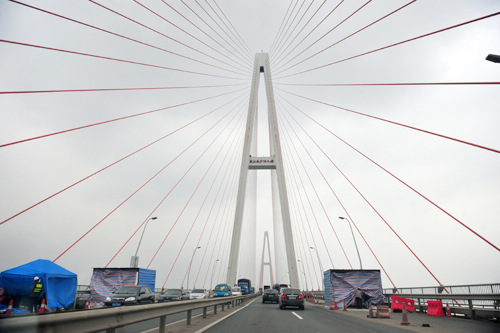|
 |
|
SAFETY DOUBTS: Wuhan No.3 Yangtze River Bridge in Hubei Province has been repaired 24 times since its construction 10 years ago (XINHUA) |
Bridge-building Corruption
Feng Zhenglin, Vice Minister of Transportation, has demanded overloaded trucks should not run on roads and bridges to ensure safety. Last month, several bridges collapsed around China, and some of the incidents involved overloaded trucks.
If a bridge is not well constructed, even if no overloaded vehicles run on it, it will sooner or later collapse.
On July 15, the 14-year-old No.3 Qiantang River Bridge in Hangzhou, Zhejiang Province, collapsed allegedly because of overloaded trucks running on it. But the 74-year-old Qiantang River Bridge stands still, despite overloaded vehicles crossing it now and then.
When the No.3 Qiantang River Bridge was first finished, project experts refused to sign the acceptance certificate, believing the bridge was unsafe. Finally, local authorities organized a quality inspection and agreed to its use. The main official involved in the project was later jailed on charges of corruption.
It's unknown yet how many problematic bridges are still in use. While we must still try to prevent overloaded vehicles from running on bridges, it's more urgent to work out effective ways to prevent corruption in bridge building.
China Youth Daily
Inaccessible Playgrounds
It's now summer vacation in China. While primary and middle school students have TV and movies to see or auxiliary classes to attend, they also hope there are places to go when they want to play basketball or football, or participate in other activities. But most of them are at a loss, as almost all school playgrounds are closed.
A recent online survey showed 50.1 percent of the respondents said nearby school playgrounds were not open during vacations.
Most schools claim only a few staff stay at schools during vacations, unable to manage sports facilities; and, at many schools, construction work is progressing, so if any accidents happen to students, the schools will be blamed. This explanation seems reasonable, but accidents are unpredictable and may also happen during class days.
In Shanghai, school playgrounds have been opened to the primary and middle school students and even other citizens. Moreover, the government provides insurance for those who play on these grounds, so that schools no longer worry about any accidents.
School playgrounds are a kind of public resource, so they are not supposed to be preserved for class days only, but should be fully utilized to benefit students and even residents. If so, this will be a big contribution to the implementation of the national fitness program.
Qilu Evening News
Useless Records
A national quality supervision and inspection working conference was recently held in southwest China's Chengdu, Sichuan Province, where the General Administration of Quality Supervision, Inspection and Quarantine proposed to speed up the establishment of a safety credit record on food and food additives by the end of the year.
Whether a system is effective or not depends on the role it plays. By now, information about 82,387 businesses has been entered on the record. But it is totally under the control of various authorities, and ordinary people are denied access.
Nowadays, many food safety problems are first uncovered by the media, rather than quality watchdogs, who are expected to discover them first, record any undesirable behavior on the credit record, and then tell the public through the media.
What consumers expect the food safety credit record to do is to provide alerts in a timely manner. But, in most cases, food safety problems were only punished when serious accidents occurred.
The public does need a food safety credit record, but it must be based on total openness, so consumers can trace any food producers they want to know about.
Xinmin Evening News
Positive Slowdown
The Beijing Municipal Bureau of Statistics said Beijing's GDP hit 741.81 billion yuan in the first half of this year, up 8 percent over the year earlier period, but lower than the national average growth of 9.6 percent.
The relatively lower GDP growth is not a shame to Beijing. The city's 12th Five-Year Plan (2011-15) set average annual GDP growth at 8 percent, the lowest among targets of the country's 31 mainland provinces, autonomous regions and municipalities.
This lower growth is signaling something positive. For many years, almost all local governments have focused on GDP, and it became almost the only indicator to measure the development of a certain area. But, in some areas, overemphasis on GDP growth has led to a distorted development mode. Beijing's example is undoubtedly a correction of the problem.
Since the start of 2011, the Beijing Municipal Government has begun to take tangible measures to slow the pace, such as controls on the auto and property sales.
Seemingly, the growth pace is slowing down, but it actually promises a stronger driving force for development. Lower GDP expectations will win the city more time to complete economic restructuring for better development in the future.
It's time for China to abandon GDP worship. Beijing's slowed-down pace is not only a good example but also a milestone in marking a change in the development mode.
Securities Times | 